Tracing students’ opinions on the humanities curriculum at IIT Kanpur, and exploring the necessity for technology programs to have social science coursework.
Several engineering students at IIT Kanpur often wonder – “why study Humanities courses?” especially when the alarm for early morning class jolts them out of sleep of which every minute feels oh so precious! From the perspective of a student who spent a couple or more years getting better at sciences to crack the JEE, this question seems genuine to a certain extent.
Vox Populi decided to float a survey among the student body to assess and investigate potential answers to the above question, and got enthusiastic and insightful perspectives from the set of responses. The UG community proactively filled out the survey and had lots to say about the HSS courses offered, grading schemes, pedagogies, and much more. Let us comb through the responses we received and see where they lead us.
Understanding the Demographic
First of all, who are the respondents? Even though the survey was sent out to all the students of IITK, all except one response was from the UG community. The lone data point was from a PhD student. An important metric to consider is how many HSS courses students have done. 92.5% of all respondents have taken 1-4 courses, with the most prominent faction (35.4%) having done two courses. It is noteworthy that of all the courses done, more than 70% were taken – or rather given – through the lottery system. Nonetheless, people did have reasons to go with the courses they got or accepted, which is what we seek to examine next.
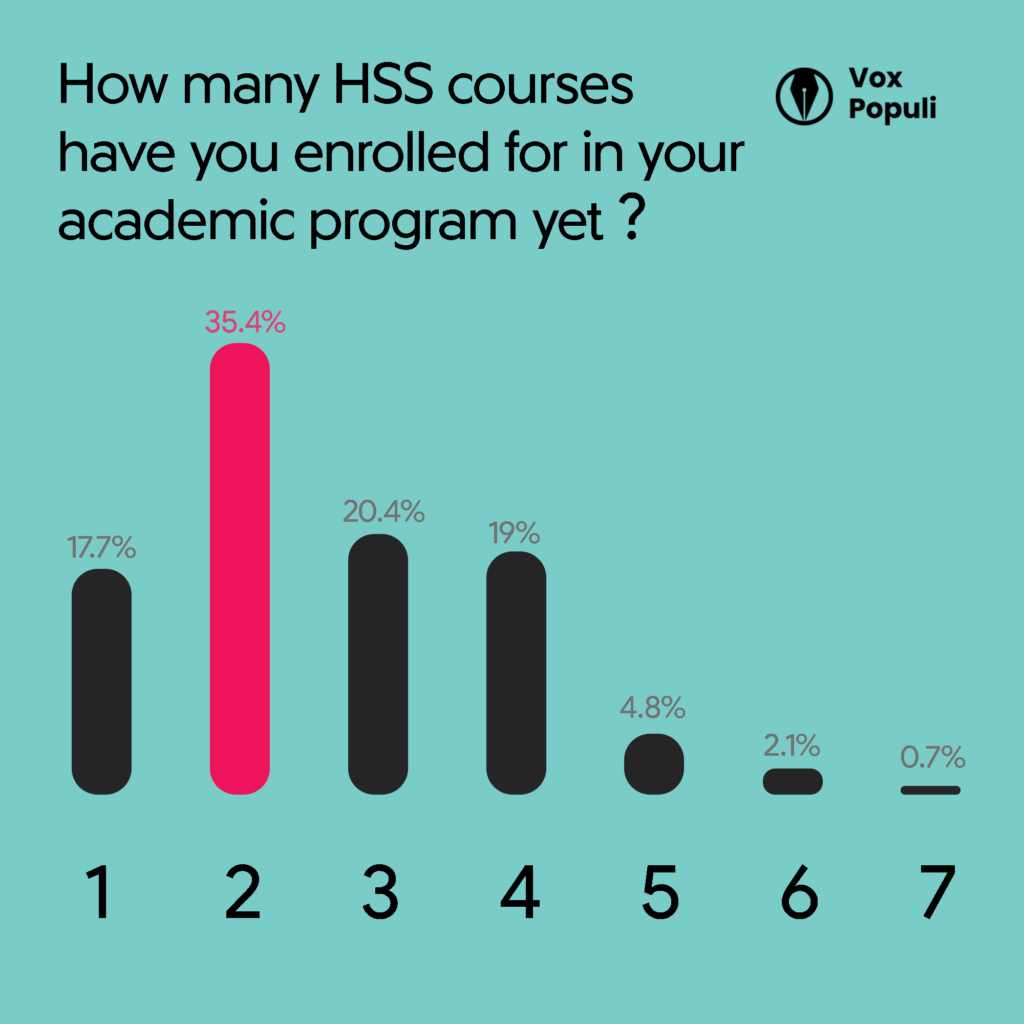
Reasons for Taking HSS Courses
Here we received answers that would already be coming to your mind. Three main reasons stand out: people take HSS courses out of interest, for grading, or the professor. Ideally, we want people to do courses they are interested in, and conversely, we want courses to interest people. However, it is concerning that less than half of the students taking HSS courses had felt that the course would be exciting or had considered interests while filling preferences. At the same time, at 42.2%, it is still the most cited reason for taking these courses, which is the good side of it. Nonetheless, it is evident that there is still a chasm between people’s interests and the courses they take.
It has to be kept in mind that we can’t lay the blame on either the students or the HSS department. Some students might not pick courses that wouldn’t help them professionally, especially when the courses they can choose from are limited. Some might have had interests in a course but found themselves allotted a different one. Some courses might have failed to arouse interest in the students, while in some, other aspects such as teaching methods or grading schemes might have overweighed the students’ interests. Still, the influence of the interest factor going up is always a good thing.
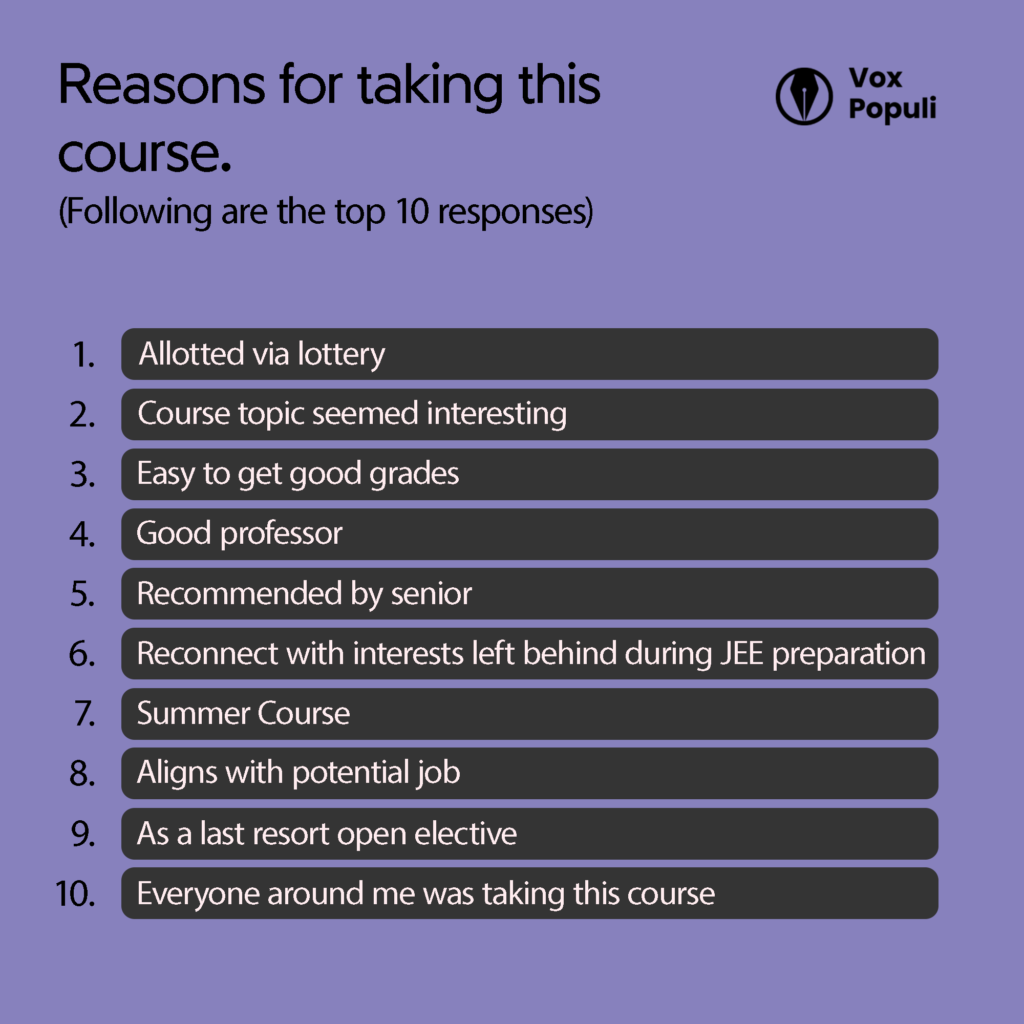
Let us next look at what is arguably the most discussed matter when the course-choosing season arrives, grading. In the survey, however, only 32% considered ease of getting good grades as one of the reasons for picking the courses they did. Adding to this is an interesting statistic – 35% of respondents were happy with their grades, while 12.6% were not pleased. Considering the amount of discussion around it, the ease of getting good grades stands among the less popular reasons for picking up a course. It might be that we overestimated how much the community values grades. Nevertheless, objectively speaking, we also have to consider the possibility that some students weren’t allotted the high-grading courses they preferred, driving down the percentage.
Next, 22.4% of the respondents cited having a “good” professor as a reason for picking a course. The teacher is an integral part of the learning experience. You often learn things from the professor, such as how to communicate your ideas coherently, less use of jargon, and so on. But with the multitude of professors working in the HSS department, how many can one know? Although a significant fraction of people found professors in the HSS department friendly and approachable, usually, what they know about a professor comes through word of mouth with no traceable source. Under such circumstances, a professor’s “good”ness is a subjective matter that is hard to convey. So what people mean by a “good” professor boils down to the comprehensibility of the course or the grading. Considering this, we can say that 22.4% makes a strong case in favour of the more objective criteria.
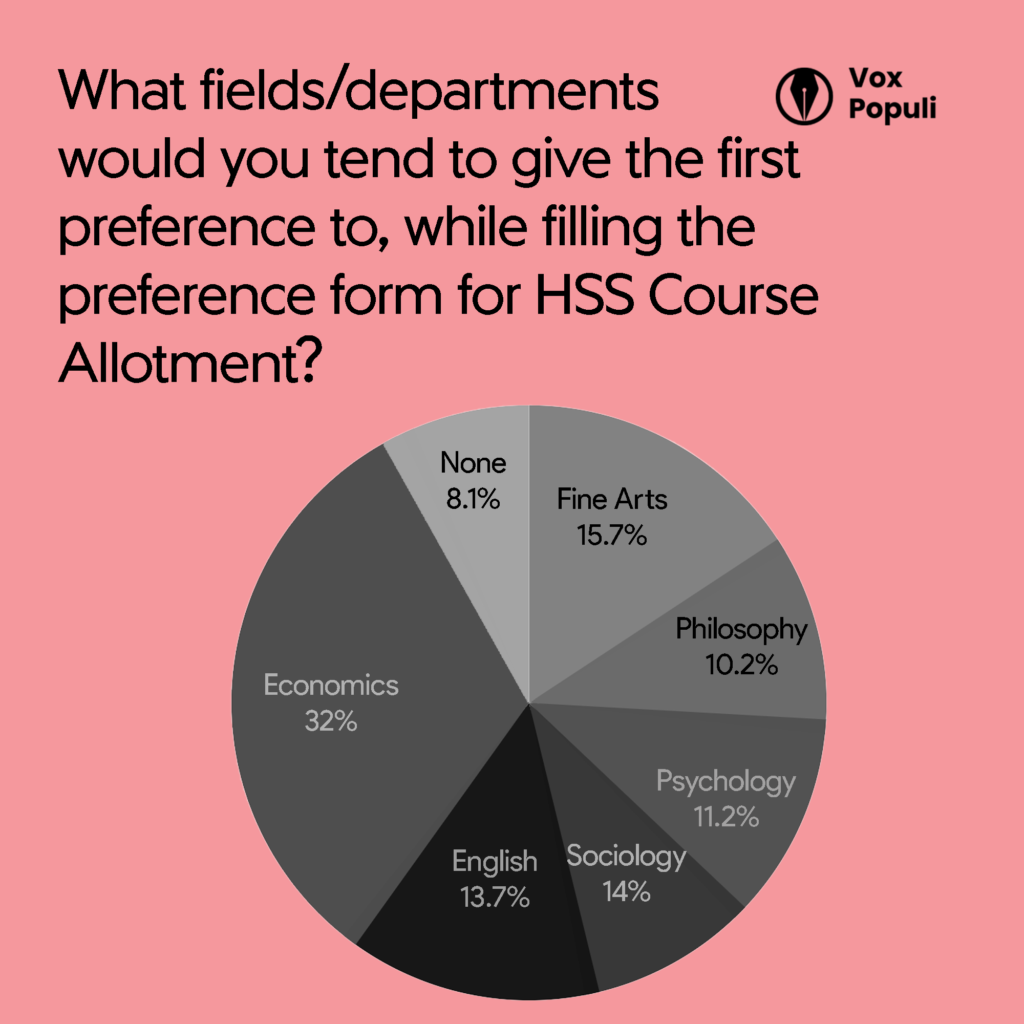
The next question we asked was relatively straightforward – Which departments in HSS do people prefer? Economics topped the chart with almost 33% of people preferring it over other disciplines. It is helpful for people who plan to explore the finance sector professionally, and it has a reputation for being easier than other courses. Naturally, it becomes the top choice for many students. The ART and ENG disciplines follow with a preference percentage in the 13-15% bracket, followed by Psychology, Philosophy, and Sociology, set around 10%.
Impact of HSS Courses
Now that we have gained an understanding of the demographic, we can move to the second part of our study. How have the HSS courses been for the students who took them? We have a wide array of responses to this. Some people were irritated by the large amount of writing required for some HSS courses; a few others felt there was a lot of jargon in these courses. Such issues can be found in any stream and should not be a defining point in the argument against HSS courses. On the other side, the brighter side (or so to say), many respondents agreed that HSS courses are an essential refuge from usual engineering courses.
In terms of difficulty, almost equal number of students stood on the ends of the spectrum, with the lion’s share staying in the middle. Regarding usefulness, 37.1% of respondents felt that the courses provided fruitful learning experiences. In comparison, 14% stood on the other side of the spectrum, saying they didn’t learn much from the courses. Even though the maximum percentage of students stood in the middle, the fact that HSS courses positively influenced close to 40% people is commendable. Further, over 30% people also reported that they imbibed new ideals into their everyday life. This indicates how truly the HSS department stands to the aim of its establishment – evolving students into better leaders and decision-makers.
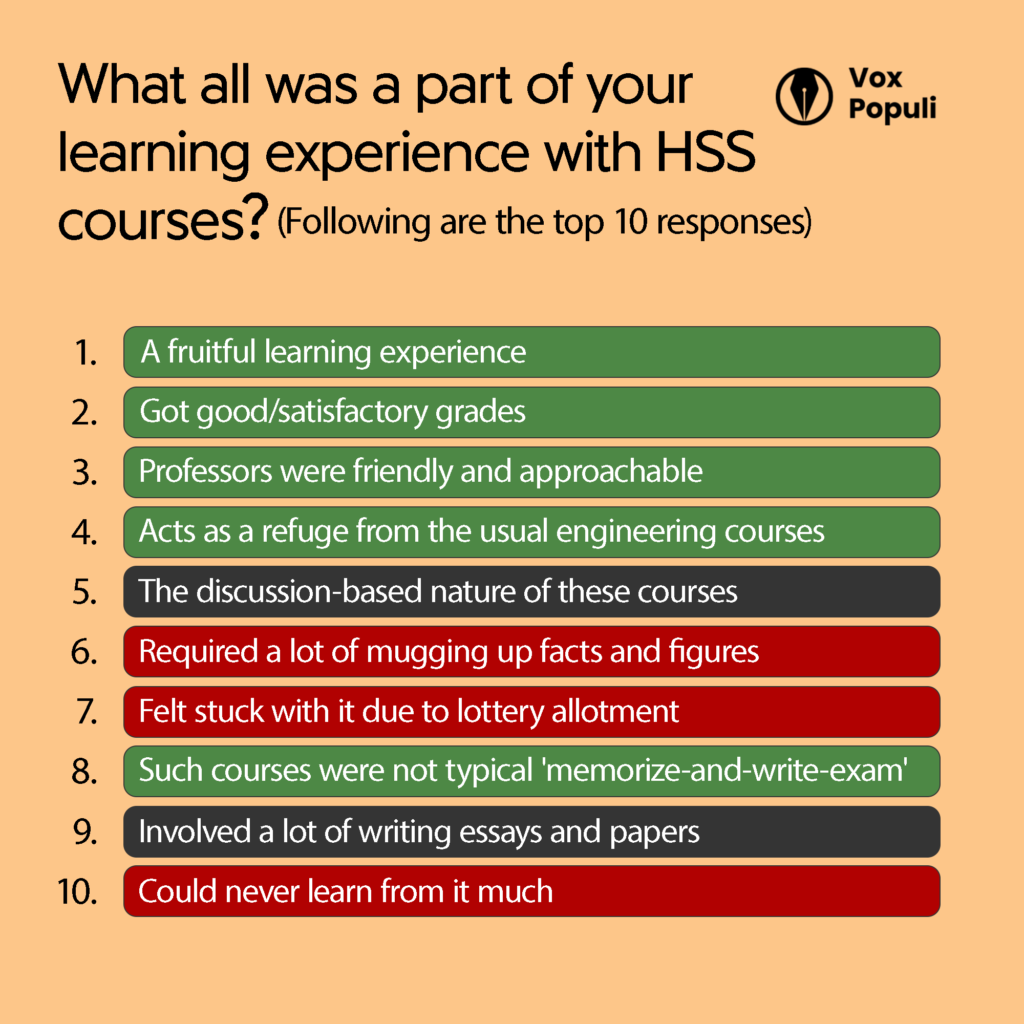
The survey concludes with some interesting data that indicates that the impact of HSS courses extends beyond the set expectations. More than 10% people opted for a minor or double major, or branch change to an HSS discipline. Add in the 5% that decided to pursue HSS for higher studies and the 12% that considered it but didn’t go through with it; we see that the number of people HSS courses positively impacted far outweighs the 23% who felt that the course didn’t live up to expectations.
Attempt to Better
It is fair to say that HSS courses are not unnecessary or pointless, as some might like to claim. There are ways through which the institute can increase engineering students’ overall interest in taking HSS courses. For instance, one way is to introduce the option of taking up minors in more disciplines under HSS for UG students. To increase the number of PG students taking HSS courses, a push towards interdisciplinary research shall prove beneficial. Addressing the issues regarding the lottery system will also help.
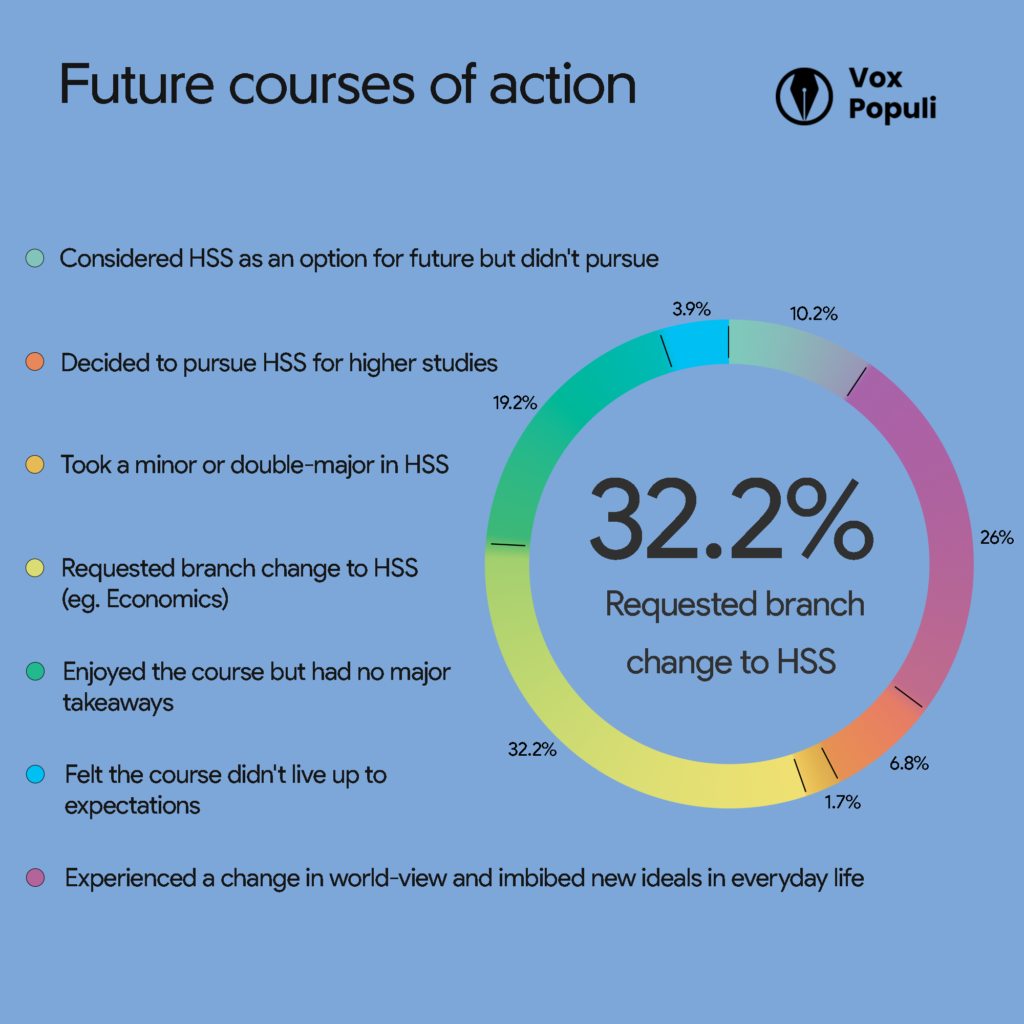
The issues we will discuss in the next article within this series are the usefulness of a random allotment system and the necessity of HSS courses in an engineering curriculum. Please stay on the lookout for it to know what more the campus junta has to say!
Credits: Utkarsh Agrawal, Hisham Hadi T, Gauravi Chandak, Aviral Upadhyay, Niliena Celine Biju
Edited and Compiled by: Sugandhaa Pandey
Design Credits: Praneat Data









